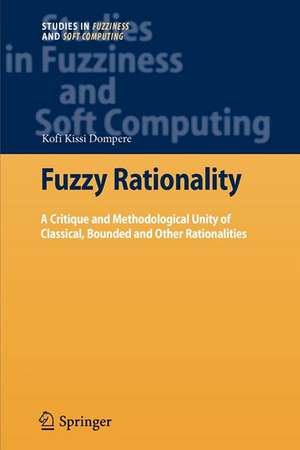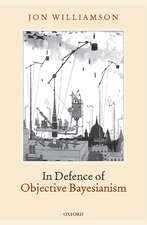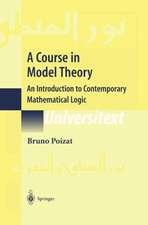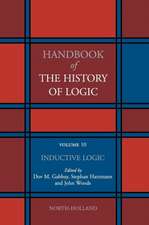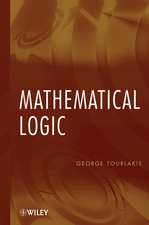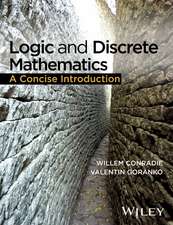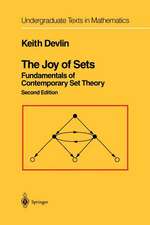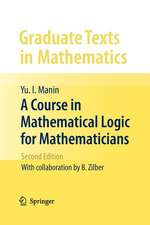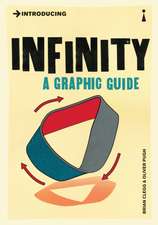Fuzzy Rationality: A Critique and Methodological Unity of Classical, Bounded and Other Rationalities: Studies in Fuzziness and Soft Computing, cartea 235
Autor Kofi Kissi Dompereen Limba Engleză Paperback – 21 oct 2010
| Toate formatele și edițiile | Preț | Express |
|---|---|---|
| Paperback (1) | 1208.41 lei 6-8 săpt. | |
| Springer Berlin, Heidelberg – 21 oct 2010 | 1208.41 lei 6-8 săpt. | |
| Hardback (1) | 1202.76 lei 6-8 săpt. | |
| Springer Berlin, Heidelberg – 20 mar 2009 | 1202.76 lei 6-8 săpt. |
Din seria Studies in Fuzziness and Soft Computing
- 20%
 Preț: 992.48 lei
Preț: 992.48 lei - 20%
 Preț: 648.25 lei
Preț: 648.25 lei - 20%
 Preț: 284.42 lei
Preț: 284.42 lei - 20%
 Preț: 872.96 lei
Preț: 872.96 lei - 20%
 Preț: 923.72 lei
Preț: 923.72 lei - 20%
 Preț: 1033.25 lei
Preț: 1033.25 lei - 20%
 Preț: 985.12 lei
Preț: 985.12 lei - 20%
 Preț: 644.82 lei
Preț: 644.82 lei - 20%
 Preț: 984.96 lei
Preț: 984.96 lei - 18%
 Preț: 938.04 lei
Preț: 938.04 lei - 20%
 Preț: 327.66 lei
Preț: 327.66 lei - 20%
 Preț: 330.59 lei
Preț: 330.59 lei - 20%
 Preț: 980.73 lei
Preț: 980.73 lei -
 Preț: 385.06 lei
Preț: 385.06 lei - 20%
 Preț: 636.88 lei
Preț: 636.88 lei - 20%
 Preț: 969.37 lei
Preț: 969.37 lei - 18%
 Preț: 942.39 lei
Preț: 942.39 lei - 20%
 Preț: 979.59 lei
Preț: 979.59 lei - 20%
 Preț: 982.49 lei
Preț: 982.49 lei - 15%
 Preț: 635.55 lei
Preț: 635.55 lei - 20%
 Preț: 640.59 lei
Preț: 640.59 lei - 20%
 Preț: 981.06 lei
Preț: 981.06 lei - 15%
 Preț: 630.23 lei
Preț: 630.23 lei - 20%
 Preț: 992.70 lei
Preț: 992.70 lei - 20%
 Preț: 975.87 lei
Preț: 975.87 lei -
 Preț: 382.22 lei
Preț: 382.22 lei - 18%
 Preț: 1202.76 lei
Preț: 1202.76 lei - 20%
 Preț: 646.63 lei
Preț: 646.63 lei - 18%
 Preț: 935.55 lei
Preț: 935.55 lei - 18%
 Preț: 932.61 lei
Preț: 932.61 lei
Preț: 1208.41 lei
Preț vechi: 1473.68 lei
-18% Nou
Puncte Express: 1813
Preț estimativ în valută:
231.33€ • 237.92$ • 191.92£
231.33€ • 237.92$ • 191.92£
Carte tipărită la comandă
Livrare economică 19 februarie-05 martie
Preluare comenzi: 021 569.72.76
Specificații
ISBN-13: 9783642099878
ISBN-10: 3642099874
Pagini: 308
Ilustrații: XXI, 283 p.
Dimensiuni: 155 x 235 x 16 mm
Greutate: 0.44 kg
Ediția:Softcover reprint of hardcover 1st ed. 2009
Editura: Springer Berlin, Heidelberg
Colecția Springer
Seria Studies in Fuzziness and Soft Computing
Locul publicării:Berlin, Heidelberg, Germany
ISBN-10: 3642099874
Pagini: 308
Ilustrații: XXI, 283 p.
Dimensiuni: 155 x 235 x 16 mm
Greutate: 0.44 kg
Ediția:Softcover reprint of hardcover 1st ed. 2009
Editura: Springer Berlin, Heidelberg
Colecția Springer
Seria Studies in Fuzziness and Soft Computing
Locul publicării:Berlin, Heidelberg, Germany
Public țintă
ResearchCuprins
General Epistemics on Science and Rationality.- Information and Knowledge in Decision-Choice Rationality.- Decision, Choice and Rationality.- Ideology and Decision-Choice Rationalities.
Textul de pe ultima copertă
This monograph is special in its orientation. It is first of its kind devoted to bringing to the general scientific community, the epistemic foundation of fuzzy paradigm composed of its logic and mathematics of reasoning. It is first of a sequence of treaties on fuzzy decision-choice rationality. The monograph presents the structure of general rationality and points of entry of classical, bounded and related rationalities. Fuzzy decision-choice rationality is then introduced as a critique and methodological unity of classical and bounded rationalities.
The critique and methodological unity begin with general epistemics of science and the role that rationality plays in knowledge production leading to a view of theory of knowledge as well as an approach to knowledge representation in support of decision-choice processes. The epistemics of science and knowledge production take us to a critical examination of relative meanings and representations of information and knowledge to create an information-knowledge structure and how such structure affects and helps to define decision-choice rationality. It is argued that all types of postulated rationality are subsumed under the optimal fuzzy rationality as a logical envelope. In so doing, a discussion is made to clarify the differences and similarities between decision and choice, and how they relate to ontological and epistemological problems of rationality, human intelligence and decision-choice processes.
The ontological and epistemological problems of decision-choice rationality are presented as composing of problem of rationality as an attribute of decision-choice agents and problem of rationality as an ideal state of decision-choice process that must reflect rationality as an attribute. Here the classical and fuzzy rationalities are distinguished and unified under the postulate of optimal decision-choice rationality where Euler’s mini-max principle rules in general substitution-transformationprocess in categorial dynamics of actual-potential duality.
The monograph is concluded with discussions on ideology and its effects on information-knowledge construct reasoning and decision-choice rationality in both scientific and non-scientific theories. Ideology is viewed as protective belt of society and its accepted mode of reasoning. The structure of revolution in ideology is then related to Kuhn’s paradigm, Lakatos’ research program, Popper’s cluster of theories and Kadrov’s research framework. It is then argued that optimal fuzzy rationality presents a complete unified cover over the optimal decision-choice rationality of classical, bounded and other rationalities with an important discussion on cost-benefit balances of ideology in social decision-choice space in which humans operate. The focus of the book is on rationality and knowledge production in fuzzy and non-fuzzy processes that constitute epistemic unity in theory of knowledge. The book will be of interest to those working in the areas of economies, decision-choice theories, philosophy of sciences, epistemology, mathematics, computer science, engineering, cognitive psychology, fuzzy mathematics, mathematics of fuzzy-stochastic processes and phenomena of vagueness and ambiguity.
The critique and methodological unity begin with general epistemics of science and the role that rationality plays in knowledge production leading to a view of theory of knowledge as well as an approach to knowledge representation in support of decision-choice processes. The epistemics of science and knowledge production take us to a critical examination of relative meanings and representations of information and knowledge to create an information-knowledge structure and how such structure affects and helps to define decision-choice rationality. It is argued that all types of postulated rationality are subsumed under the optimal fuzzy rationality as a logical envelope. In so doing, a discussion is made to clarify the differences and similarities between decision and choice, and how they relate to ontological and epistemological problems of rationality, human intelligence and decision-choice processes.
The ontological and epistemological problems of decision-choice rationality are presented as composing of problem of rationality as an attribute of decision-choice agents and problem of rationality as an ideal state of decision-choice process that must reflect rationality as an attribute. Here the classical and fuzzy rationalities are distinguished and unified under the postulate of optimal decision-choice rationality where Euler’s mini-max principle rules in general substitution-transformationprocess in categorial dynamics of actual-potential duality.
The monograph is concluded with discussions on ideology and its effects on information-knowledge construct reasoning and decision-choice rationality in both scientific and non-scientific theories. Ideology is viewed as protective belt of society and its accepted mode of reasoning. The structure of revolution in ideology is then related to Kuhn’s paradigm, Lakatos’ research program, Popper’s cluster of theories and Kadrov’s research framework. It is then argued that optimal fuzzy rationality presents a complete unified cover over the optimal decision-choice rationality of classical, bounded and other rationalities with an important discussion on cost-benefit balances of ideology in social decision-choice space in which humans operate. The focus of the book is on rationality and knowledge production in fuzzy and non-fuzzy processes that constitute epistemic unity in theory of knowledge. The book will be of interest to those working in the areas of economies, decision-choice theories, philosophy of sciences, epistemology, mathematics, computer science, engineering, cognitive psychology, fuzzy mathematics, mathematics of fuzzy-stochastic processes and phenomena of vagueness and ambiguity.
Caracteristici
Establishes an essential epistemic framework of fuzzy paradigm and the rationality that it induces for approximate reasoning Presents the theory of knowledge and how fuzzy paradigm instructs us in our understanding of cognitive movements from categories of potential to categories of actual Describes the role that fuzzy rationality plays in our information-knowledge enterprise
